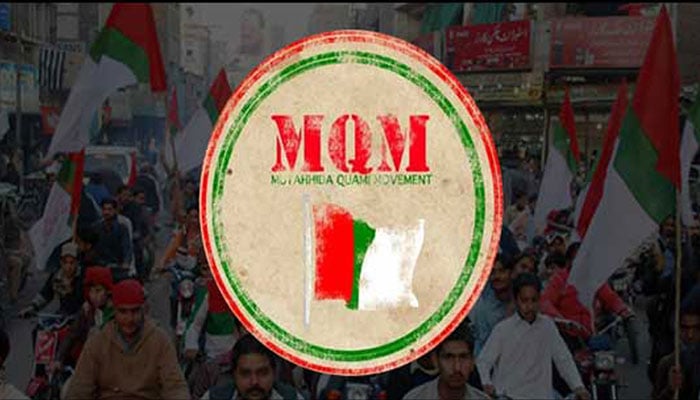Non-local officials have worsened civic issues, says MQM-Pakistan
Muttahida Qaumi Movement-Pakistan (MQM-P) leaders on Saturday claimed the Pakistan Peoples Party’s (PPP) provincial government has been posting incompetent and corrupt officials from interior Sindh to urban centres to mint money from their residents.
Addressing a news conference, they pointed out that because of the PPP government’s unfamiliarity with the civic issues and their inability to resolve them, civic problems in the city have been worsening.
Khawaja Izharul Hasan and Muhammad Hussain said that “the biased PPP’s enmity with the MQM-P is understandable, but enmity with the people of the province’s urban centres is beyond comprehension”.
“Provincial minister Sharjeel Memon says there’s no water in the Hub Dam, but today the Hub Dam is full, but still the residents of Karachi are longing for a drop of water,” said Hasan.
He said that the managing director of the Karachi Water & Sewerage Board is not willing to receive the phone calls of the public representatives elected from the city.
He also said that the local government system has been abolished since August 31 last year. “Administrators have been posted, but what is their performance in the duration of 10 months,” he asked, saying that the Sindh advocate general in a recent report termed all the administrators and deputy commissioners ignorant.
Hasan said the Sindh government plans to take four hospitals from the Karachi Metropolitan Corporation. “But the provincial government has not built a model hospital in its 13-year rule where Asif Ali Zardari, Bilawal Bhutto Zardari or provincial ministers are provided treatment.”
As for Hussain, he pointed out that residential and commercial buildings in Karachi are being demolished on the Supreme Court’s orders, but the apex court’s other orders are being ignored completely. “The MQM-P demands that alternatives be provided to the ‘victims’ before implementing the court’s decisions.”
-
 James Van Der Beek's Final Conversation With Director Roger Avary Laid Bare: 'We Cried'
James Van Der Beek's Final Conversation With Director Roger Avary Laid Bare: 'We Cried' -
 Jaden Smith Walks Out Of Interview After Kanye West Question At Film Premiere
Jaden Smith Walks Out Of Interview After Kanye West Question At Film Premiere -
 Michelle Obama Gets Candid About Spontaneous Decision At Piercings Tattoo
Michelle Obama Gets Candid About Spontaneous Decision At Piercings Tattoo -
 Why Halle Berry Wasn't Ready For Marriage After Van Hunt Popped Question? Source
Why Halle Berry Wasn't Ready For Marriage After Van Hunt Popped Question? Source -
 Bunnie Xo Shares Raw Confession After Year-long IVF Struggle
Bunnie Xo Shares Raw Confession After Year-long IVF Struggle -
 Brooks Nader Reveals Why She Quit Fillers After Years
Brooks Nader Reveals Why She Quit Fillers After Years -
 Travis Kelce Plays Key Role In Taylor Swift's 'Opalite' Remix
Travis Kelce Plays Key Role In Taylor Swift's 'Opalite' Remix -
 How Jennifer Aniston's 57th Birthday Went With Boyfriend Jim Curtis
How Jennifer Aniston's 57th Birthday Went With Boyfriend Jim Curtis -
 JoJo Siwa Shares Inspiring Words With Young Changemakers
JoJo Siwa Shares Inspiring Words With Young Changemakers -
 James Van Der Beek Loved Ones Breaks Silence After Fundraiser Hits $2.2M
James Van Der Beek Loved Ones Breaks Silence After Fundraiser Hits $2.2M -
 Disney’s $336m 'Snow White' Remake Ends With $170m Box Office Loss: Report
Disney’s $336m 'Snow White' Remake Ends With $170m Box Office Loss: Report -
 Travis Kelce's Mom Donna Kelce Breaks Silence On His Retirement Plans
Travis Kelce's Mom Donna Kelce Breaks Silence On His Retirement Plans -
 Premiere Date Of 'Spider-Noir' Featuring Nicolas Cage Announced
Premiere Date Of 'Spider-Noir' Featuring Nicolas Cage Announced -
 Pedro Pascal's Sister Reveals His Reaction To Her 'The Beauty' Role
Pedro Pascal's Sister Reveals His Reaction To Her 'The Beauty' Role -
 Kate Middleton Proves She's True 'children's Princess' With THIS Move
Kate Middleton Proves She's True 'children's Princess' With THIS Move -
 Paul Anka Reveals How He Raised Son Ethan Differently From His Daughters
Paul Anka Reveals How He Raised Son Ethan Differently From His Daughters




